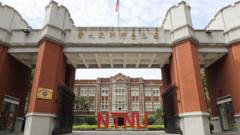**Taiwan's significant "Great Recall" vote aimed at politicians accused of pro-China affiliations results in opposition Kuomintang retaining their majority, raising concerns about political polarization and the legislative landscape.**
**Taiwan's "Great Recall" Vote Fails to Oust Pro-China Lawmakers**

**Taiwan's "Great Recall" Vote Fails to Oust Pro-China Lawmakers**
**Historic recall election sees Kuomintang retain their seats amid political polarization**
In a significant political event, Taiwan's recent recall election, dubbed the "Great Recall," has concluded with no lawmakers being ousted, allowing the Kuomintang (KMT) to maintain their positions. This unprecedented vote came as a response to accusations that several KMT politicians were excessively aligned with China, prompting a civic movement to call for their removal.
Thousands of Taiwanese citizens participated in the voting process held on Saturday across 24 districts, all previously under KMT control. Voters faced a straightforward yes or no question regarding the retention of their legislator. Despite the high stakes and intense scrutiny surrounding this vote, early results indicate that the majority in every district opted against the removal of their representatives.
The KMT, along with its allies, thus retains its slight majority in the legislature, with further voting planned for August to address seven additional seats. Analysts suggest the failure of the "Great Recall" could deepen existing political divides in Taiwan and embolden legislators to act contrary to public sentiment.
The origins of this recall movement trace back to the January elections where the Democratic Progressive Party (DPP) claimed the presidency with William Lai but ceded parliamentary dominance to the KMT. The opposition's collaboration with smaller parties to obstruct DPP legislation sparked protests leading to the Bluebird movement. Some citizens view the KMT as being influenced by Beijing, primarily due to previous engagements of its lawmakers with Chinese officials.
Amidst this political turmoil, civic groups promoting the recall gathered substantial support for 31 lawmakers, all from the KMT, by utilizing social media campaigns and public demonstrations. In response, KMT and allied factions organized rallies to counter the recall efforts, accusing the DPP of orchestrating the recall movements to undermine their electoral victory.
Despite initially distancing itself from the recall, the DPP has shown increasing support for the movement, with Lai encouraging party officials to assist those advocating for the recall, framing it as a defense of democracy. As the debate intensifies, even Beijing has expressed its views, criticizing Lai’s tactics in what they allege to be an effort to suppress opposition under democratic pretenses.




















